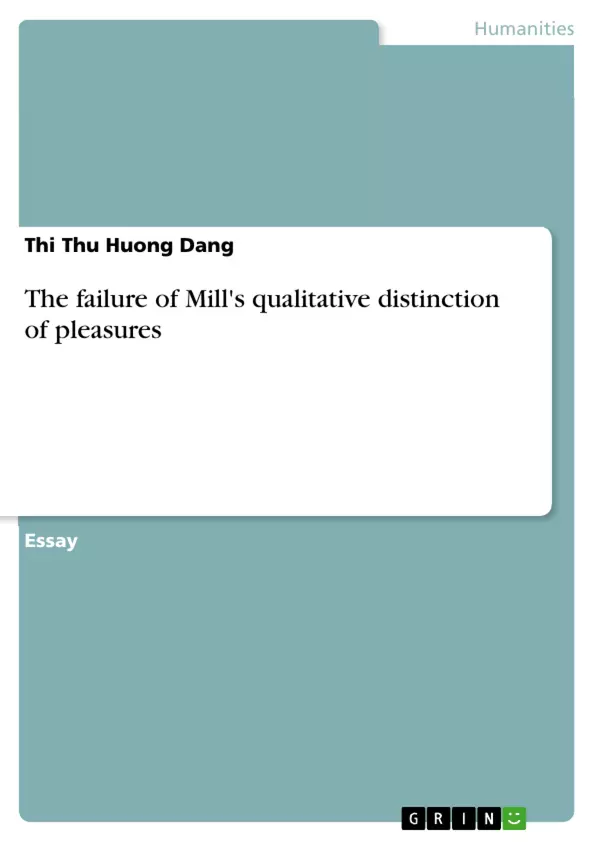In reply to the standing objection that utilitarianism is a pig philosophy, John Stuart Mill (1806 – 1873) holds that Benthamite utilitarians “have fully proved their case” (II, 4) by pursuing quantitative hedonism which emphasizes the difference of quantity in pleasures . However, he still aims at taking a “higher ground, with entire consistency” (II, 4) to defend utilitarianism by introducing his later-called qualitative hedonism that is based on the difference of quality in pleasures in Chapter II of Utilitarianism. In the essay, I argue that Mill’s qualitative distinction of pleasures is problematic and inconsistent with hedonism, to which he explicitly commits himself. As a result, instead of providing support for utilitarianism, it causes more problems.
Table of Content
INTRODUCTION
Mill’s qualitative distinction of pleasures
The problems with competent judges
The problems of higher quality pleasures
Higher pleasures vs. Hedonism?
CONCLUSION
REFERENCE
INTRODUCTION
In reply to the standing objection that utilitarianism is a pig philosophy, John Stuart Mill (1806 – 1873) holds that Benthamite utilitarians “have fully proved their case” (II, 4) by pursuing quantitative hedonism which emphasizes the difference of quantity in pleasures . However, he still aims at taking a “higher ground, with entire consistency” (II, 4) to defend utilitarianism by introducing his later-called qualitative hedonism that is based on the difference of quality in pleasures in Chapter II of Utilitarianism. In the essay, I argue that Mill’s qualitative distinction of pleasures is problematic and inconsistent with hedonism, to which he explicitly commits himself. As a result, instead of providing support for utilitarianism, it causes more problems.
Mill’s qualitative distinction of pleasures
Unlike Jeremy Bentham (1748 - 1832), who sees no difference of quality in pleasures, Mill claims pleasures can differ in both quality and quantity:
“It would be absurd that while, in estimating all other things, quality is considered as well as quantity, the estimation of pleasures should be supposed to depend on quantity alone.
If I am asked, what I mean by difference of quality in pleasures, or what makes one pleasure more valuable than another, merely as a pleasure, except its being greater in amount, there is but one possible answer.” (II, 4 – 5)
And what is his answer? Or in other words, which pleasures, then, according to Mill, are qualitatively better and worse?
Here is it: “If one of the two [pleasures] is, by those who are competently acquainted with both, placed so far above the other that they prefer it, even though knowing it to be attended with a greater amount of discontent, and would not resign it for any quantity of the other pleasure which their nature is capable of, we are justified in ascribing to the preferred enjoyment a superiority in quality, so far outweighing quantity as to render it, in comparison, of small account.” (II, 5)
This passage is often read as saying: One pleasure is higher in quality than another if and only if at least a majority of the people who are competently acquainted with both always prefer the former no matter how much of the latter is available (Riley, 2003: 410; Booher, 2007).
Mill also adds that: “[T]hose who are equally acquainted with, and equally capable of appreciating and enjoying, both, do give a most marked preference to the manner of existence which employs their higher faculties (II, 6).” It means the pleasures that are the exercise of higher faculties are higher in quality . Once being made aware of these higher faculties, we do not regard anything as happiness without their gratification (II, 4) because of our sense of dignity, which also makes us never willingly prefer or choose the lower quality pleasures in conflict with the higher, otherwise than momentarily and involuntarily (II, 6) .
Frequently asked questions
What is the main topic of this text on Mill's Utilitarianism?
The text focuses on John Stuart Mill's qualitative distinction of pleasures in his work Utilitarianism, arguing that it is problematic and inconsistent with hedonism.
What is Mill's argument against Bentham's Utilitarianism?
Mill argues that Bentham's quantitative hedonism, which emphasizes the amount of pleasure, is insufficient. Mill proposes a qualitative hedonism that considers the quality of pleasures, not just the quantity.
How does Mill define the difference in quality between pleasures?
Mill argues that some pleasures are qualitatively higher than others. He suggests that if individuals who are competently acquainted with two pleasures consistently prefer one, even with accompanying discontent, that pleasure is superior in quality.
What are "higher faculties" according to Mill?
Mill refers to "higher faculties" as those associated with intellectual and moral capabilities. The pleasures derived from exercising these faculties are considered higher in quality.
What is Mill's view on people choosing lower pleasures over higher pleasures?
Mill believes that once people become aware of their higher faculties, they will not willingly choose lower pleasures over higher pleasures, except perhaps momentarily and involuntarily, due to their sense of dignity.
What is the reception of Mill's qualitative distinction of pleasures?
The text mentions that Mill's qualitative distinction of pleasures has been met with significant critical attention, much of which is hostile.
Who are Jeremy Bentham and John Stuart Mill?
Jeremy Bentham (1748 - 1832) and John Stuart Mill (1806 - 1873) are important philosophers, and key figures in Utilitarianism.
What is hedonism?
Hedonism is a philosophical doctrine that pleasure is the most important thing in life.
- Citar trabajo
- Thi Thu Huong Dang (Autor), 2008, The failure of Mill's qualitative distinction of pleasures, Múnich, GRIN Verlag, https://www.grin.com/document/119648



